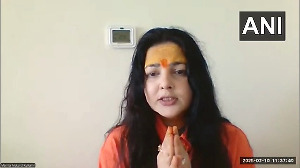It will be payback time for the country's most talented minds -- the stars from Indian Institutes of Technology -- when they meet for three days in Mumbai in December. PanIIT 2006, an umbrella organisation of IITians, has scheduled the annual alumni conference from December 23 to December 25.
This time a record 5,000 IITians are expected to participate in the convention, many of them from overseas.
The mission is multipronged:
- To apply technological solutions to solve India's perennial problems;
- Bring about professionalism in governance, and
- Encourage entrepreneurship and build global brands.
PanIIT also plans to have a permanent secretariat in India to look after the initiatives with a secretary general and a core group that will work on funding and other initiatives on nation building.
- Participate in the PanIIT 2006 Global Conference! Click here to register now!
"We don't have an ecosystem of financing and encouraging young entrepreneurs. The overall ethos in the country doesn't support entrepreneurship. We should encourage youngsters to take risks. In India, the system is against you, but in the United States at least the system does not prevent you from succeeding," says Ashank Desai, chairman, Mastek.
Desai who is the PanIIT 2006 event chairman points out that this is an opportunity for IITians to contribute to nation building and give back to the country, which gave them valuable education. We should come together in large numbers to 'inspire' and 'involve' others to 'transform' India," he added.
Ashank Desai elaborates how PanIIT can make a difference and help transform India in an interview with Manu A B.
What is the theme of PanIIT 2006?
This will be the largest PanIIT gathering, with about 5,000 IITians participating in the meet. The difference between this year's PanIIT event and earlier conferences is that for the first time we have carried out a study of IITians to find out what interests them.
We found that there are 3-4 things they are excited about -- finding technological solutions to solve India's problems, brand building, governance (how to bring professionalism in governance), and entrepreneurship.
There are many young IITians who are keen on entrepreneurship. President A P J Abdul Kalam also suggested that we should have a session on entrepreneurship so we decided to have a theme based on 'IIT: Inspire, Involve & Transform India.' The idea is to inspire and involve the younger generation to come forward to contribute towards nation building.
How have the earlier PanIIT events helped?
Each of the PanIIT events has been a milestone. The first one held at Silicon Valley in 2003 was attended by (Microsoft chairman) Bill Gates. The idea was to create a networking event and it turned out to be a huge success. It created awareness that IITians can come forward and do something. The need to form a global organisation got a fillip at the forum.
The second event was held at Delhi in 2004. President Kalam attended the function and pointed out what IITians should do. This led to the formation of two initiatives: a project on advanced computing and a rural transformation initiative.
The third event was held in the United States in 2005, by this time there was a good awareness about IITians in America. In the same year, the US administration honoured IITians for their contribution to the State. This helped to form one or two more groups in the US.
Then we had PanIIT groups in India, Singapore, Japan and Australia. Within these countries, sub-chapters were formed. The journey has been that of building organisations, creating awareness, getting recognition and getting started with some projects.
What will be the agenda of the PanIIT 2006 meet?
We will be discussing 7 important themes this year:
- How to build a knowledge economy in India
- How do we take out 260 million people out of poverty
- How to bring professionalism in governance
- How to improve standard of living in Indian cities
- How to learn from successful entrepreneurs
- Women achievers will hold women-specific programmes for empowerment of women.
The focus will not be just on speeches and discussions, we will also be showcasing the work done by IITians in these areas. We also have bureaucrats and politicians at the forum to tell us how we can make this happen by implementing them. President Kalam will inaugurate the event and Prime Minister Dr Manmohan Singh will also address the IITians.
How do you think this event will help in taking forward the nation building activities?
These events are directed towards building a sustainable movement to put into practice the ideas that we have. We have invited several bureaucrats and politicians who will hear us and guide us to take our mission forward.
We are keen on developing some catalysts among IITians. For instance, if someone is interested in solving water woes, he will attend the session on this and interact with people and chart out a course of action. Some IITians are already working on improving technical education In India. At this stage we are not clear on what will actually take place.
We have created a forum where people can network. For instance, two guys will be demonstrating their water recycling initiatives. This may help guide others on similar projects in other cities.
How do IITians plan to give back to the country?
It's not just IITians from India, IITians from abroad will also participate in the event. This will be a forum where they can come together and debate on how they can support initiatives in India. IITians from the US and India can join hands to support projects in India. There is an interesting project going on where a group of IIT faculty is partnering with other colleges to improve the quality of education.
How do you plan to fund the projects?
The surplus fund from the event will be used to support PanIIT. We will have a meeting of the distinguished alumni (every year IIT selects a few people which have done extremely well in the society) of IIT. There is a group of about 300 IITians, who will meet a day before the event to discuss about fund mobilisation. A secretariat will be formed soon to look after the PanIIT initiatives with a secretary general in one of the cities. The secretariat will focus on funding and dedicate itself several other initiatives.
What do you think is the biggest contribution of IITians to India?
I was also selected as one of the distinguished alumni. I always thought that it would have people from the business sector. When I went to receive the award I found the group had a filmmaker, a social activist, a bureaucrat, an academician, etc. Arvind Kejriwal, the man behind the Right To Information Act, is an IITian. He is backed by other IITians. Among them are Mumbai-based social-activist Shailesh Gandhi, former chief minister of Goa Manohar Parrikar and Minister of State for Commerce Jairam Ramesh.
The contribution of IITians is not just in one sector, so its difficult to quantify it. IITians have done extensive work in RTI, rural development, academics, bureaucracy and even in politics.
However, we are trying to quantify the contribution in terms of value. Hopefully, we will be presenting it at the forum.
There is a trend of IITians going abroad and not staying back in India. What are your views on this?
This is a myth. There are about 300,000 IITians of which 85 per cent are in India. Only 15 per cent have gone abroad. It is not as if everyone is abroad. You hear more about them because some of them have done very well abroad.
The IITians who have gone abroad are not actually a loss to India. They are responsible for quite a lot of funding that has come to India. Some of them are coming back to set up ventures in India now.
How do you think PanIIT can help develop India as a knowledge economy?
We will be discussing this in detail. In a knowledge economy, first there has to be knowledge generation, creation, preservation and dissemination to use it for the betterment of the society.
One of the initiatives will be to build a broadband connectivity. For knowledge creation we should have research-oriented institutes. Knowledge Process Outsourcing is coming up in a big way so we need to build an industry to sustain KPO.
We need to have strong Intellectual Property Rights to preserve our knowledge. We should have proper laws in place to conduct business. For dissemination, we need to have local content and ensure connectivity even in villages. There is so much talent all around. . . we must strive to bring it together.
Another part of knowledge economy is cross border work, we will be looking at this also, and we need to collaborate with universities outside India to form knowledge networks.
How important is entrepreneurship in developing India?
Entrepreneurship will be one of our focus areas. President Kalam has also urged us to bring forth success stories of entrepreneurs to inspire upcoming entrepreneurs. Entrepreneurship is very important as it involves job creation. We are trying to find how many IITians have started their own firms. About twenty top companies in the IT sector are founded by IITians just as there are several others in other sectors that were founded by IITians.
How important is innovation for entrepreneurship?
Innovation is a key to product development. We have a session called Gurukul, this is basically to invite entrepreneurs to be part of a mentoring process. This will involve about 300 entrepreneurs, who will be divided into small groups of 20 entrepreneurs who in turn will mentor 20 budding entrepreneurs.
Innovation is very important and the Society for Innovation and Entrepreneurship at IIT-Bombay is a perfect example where professors and students have come together to innovate and launch companies.
We have invited SINE to showcase their talent at the event. There are about 22 companies under SINE who are doing very well.
Will venture capitalists be involved in the forum?
Yes, VCs will be present at the forum. They can interact with prospective entrepreneurs and initiate talks with entrepreneurs to fund start-ups.
Why do we lag behind in entrepreneurship?
The work they have done at SINE is phenomenal, designing an artificial foot, making a software to test car speeds and mobile applications etc. But what we lack is entrepreneurs who can take it up and market it. We don't have an ecosystem of financing and encouraging them. The overall ethos in the country does not support entrepreneurship.
This example best talks about the Indian attitude: A guy starts his own business. But his marriage proposal is turned down by a girl who ultimately marries a guy who is employed in his office! We are averse to taking risks. In fact we should encourage youngsters to take risks.
In India, we have several infrastructure problems also, the system is against you, you waste a lot of time travelling but in the US at least the system doesn't not prevent you from succeeding.
How you think IITs transform the students? What was your experience?
In IITs you have competitive excellence, you compete with the best in the world. You may have been the best in your school but you realise that the guy sitting next to you is 10 times better than you. You realise where you stand and learn how to excel. Your ego gets shattered on the very first day at IIT.
You learn to compete and excel, this spirit is very important in business. IITs also help you hone your analytical and problem solving capability. You also build a network of friends, which helps later in life. It creates lasting bonds.
Do you think India should set up more IITs?
Setting up more IITs makes no sense but we need institutes like IITs. To become a knowledge economy we need to create good institutes with research and dveleopment facilities.
Calling the new institutes 'IITs' is not an issue, what is important is to support and develop the exiting institutes to IIT level. We have 400,000 engineers graduating but their quality is not something that we can be proud of. IITs contribute to just 5 per cent of the engineers in India, so starting two more IITs will not make much of a difference.
Why is it that we are not able to bring out talented people?
The main issue is faculty, unfortunately the salary for faulty is not very high. When a IIT student after a few years' of job experince joins a company like Mastek, he will draw more salary than the director of IIT. It's not that they work just for money but we need to create a salary structure that is attractive.
We have to create an environment where research and teaching is very rewarding. The other institutes also lack good funding and infrastructure. The quality of students is good but they need to be trained properly. US' Massachusetts Institute of Technology has distant education systems, we should also have one such system in place.
What would be your advice to people aspiring to join IITs?
You should have a desire to excel. The system is very demanding unless you work hard you cannot survive. You have to set yourself a very high standard.
Your IQ gets you into the IITs but you must learn social dynamics. Social skills and emotional intelligence are important. You need to find out your strengths, build your potential. There is so much to learn at the IITs. You should learn to reinvent things.
I did a project when I was at IIT, I redefined the ways of doing a particular project and the professor still remembers it .You should also have the ability to get things done.
- Participate in the PanIIT 2006 Global Conference! Click here to register now!






 © 2025
© 2025